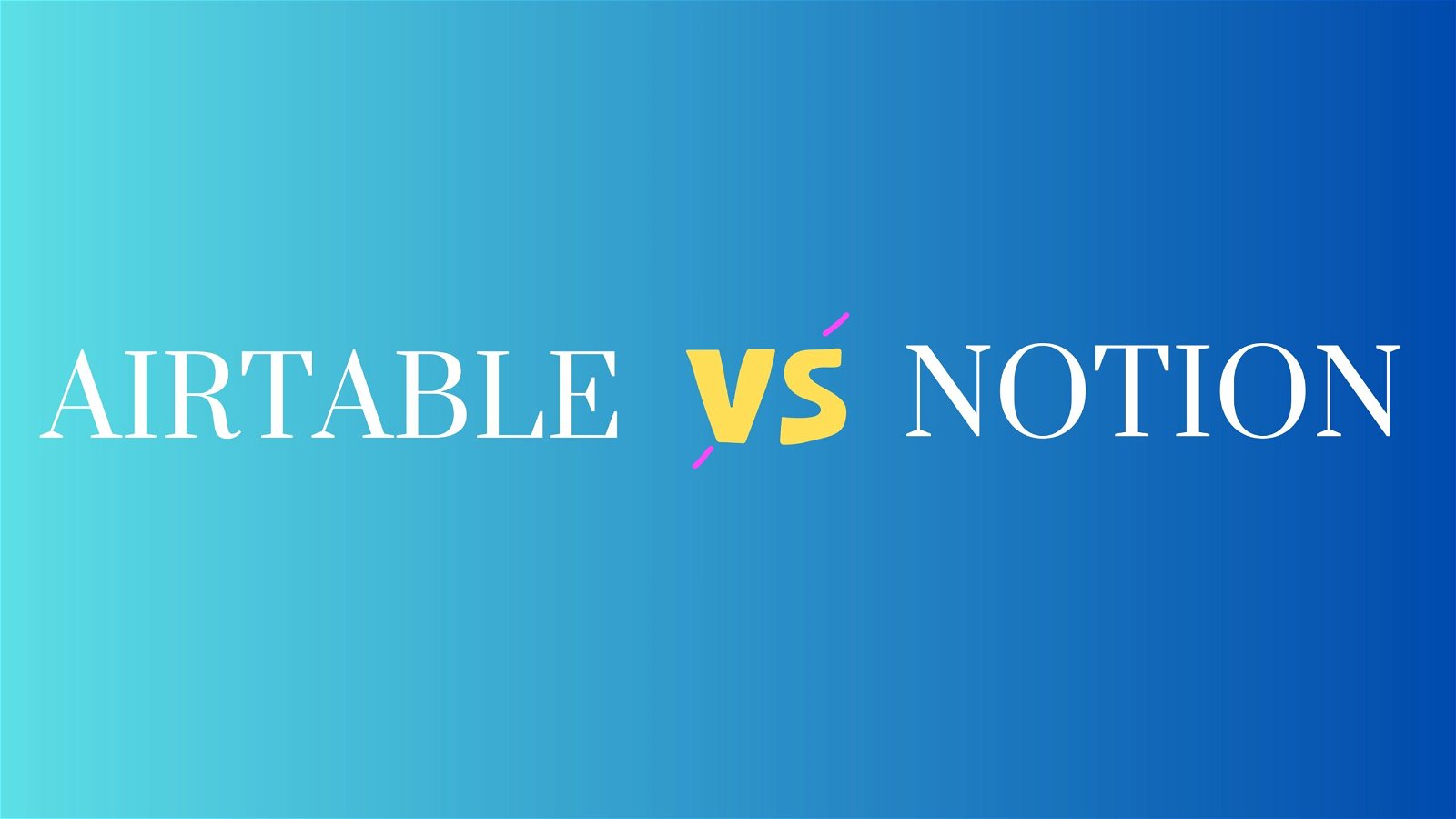Notion and Airtable have evolved into enhanced versions of more basic applications. Originally a conventional notes app, the notion has transformed into an all-encompassing workspace. Meanwhile, Airtable, initially resembling a standard spreadsheet, now emphasizes its capabilities in app-building, though this shift may not be immediately apparent.
While a direct one-to-one comparison may be challenging due to their diverse functionalities, we can break down their features to help you determine which platform aligns better with your specific requirements.

Notion
Notion is an all-in-one workspace platform that seamlessly combines note-taking, document collaboration, project management, and more. It provides users with a versatile and flexible environment for creating and organizing various types of content. Notion’s interface is block-based, allowing users to structure information using different content blocks like text, images, databases, and calendars. Collaboration is a key focus, with real-time editing, commenting, and customizable access permissions. The notion is known for its sleek design and adaptability, making it suitable for a wide range of use cases, including personal organization, team collaboration, and knowledge management.
Airtable
Airtable is a collaborative database and spreadsheet tool designed to give users a dynamic platform for organizing and managing structured data. Combining the familiarity of a spreadsheet with enhanced functionalities, Airtable allows users to create customizable databases with different field types, and link records, and employ formulas for calculations. It is particularly well-suited for projects involving structured data, such as project management, event planning, and inventory tracking. Airtable emphasizes collaboration, offering features like real-time editing, commenting on records, and varied access permissions for team members. Additionally, it integrates with various third-party apps and services, enhancing its utility and adaptability in different workflows.
Airtable vs Notion
Here’s a simplified comparison table of Airtable and Notion based on key features:
| Feature | Airtable | Notion |
|---|---|---|
| Primary Purpose | Collaborative database and spreadsheet tool | All-in-one workspace for notes and collaboration |
| Data Structure | Structured data with tables and fields | Flexible block-based structure |
| Collaboration | Real-time collaboration, comments, permissions | Real-time collaboration, comments, permissions |
| User Interface | Spreadsheet-like interface | Modern block-based design |
| Use Cases | Project management, event planning, inventory tracking | Note-taking, knowledge management, project documentation |
| Integration | Integrates with third-party apps and services | Integrates with third-party apps and services |
| Customization | Customizable fields, views, and forms | Highly customizable with content blocks |
| Learning Curve | Easy for spreadsheet users; intuitive for organizing data | It might have a steeper learning curve due to the versatility |
| Cost | A freemium model with paid plans for advanced features | A freemium model with paid plans for advanced features |
| Mobile Apps | Available on iOS and Android | Available on iOS and Android |
| API Support | Yes | Yes |
Airtable and Notion are both popular productivity tools, but they serve different purposes and have distinct features.
Here’s a brief comparison of Airtable and Notion:
1. Primary Purpose
Airtable: Airtable is primarily a cloud-based spreadsheet and database platform. It allows users to create customizable databases with a spreadsheet-like interface, making it easy to organize and manipulate data.
Notion: Notion is an all-in-one workspace that combines note-taking, task management, and collaboration features. It provides a flexible and customizable environment for creating documents, databases, and more.
2. Use Cases
Airtable: Ideal for managing and organizing structured data, project tracking, content planning, and collaboration on databases.
Notion: Suitable for note-taking, knowledge management, project collaboration, task management, and creating documents with rich media content.
3. Interface and Flexibility
Airtable: Offers a grid-like interface similar to a spreadsheet, with various field types (text, date, attachment, etc.). It is highly flexible and can be adapted to different use cases.
Notion: Provides a block-based interface where users can create different content types (text, images, databases, to-do lists) using blocks. It offers a more free-form and flexible structure.
4. Collaboration
Airtable: Supports real-time collaboration, allowing multiple users to work on the same database simultaneously. It includes commenting and revision history features.
Notion: Designed for collaborative work with features like real-time editing, commenting, and the ability to mention team members. It’s often used for team collaboration and project management.
5. Integrations
Airtable: Integrates with various third-party tools and services, including Zapier, Slack, and more, making it easier to connect with other apps.
Notion: Also offers integrations with popular apps and services, but its ecosystem may not be as extensive as Airtable’s.
6. Pricing
Airtable: Offers a freemium model with free and paid plans. The pricing is based on usage, and more advanced features are available in paid plans.
Notion: Has a freemium model as well, with free and paid plans. Notion’s pricing is generally based on a per-user subscription model.
Which Plugin Is Better In Comparison To Airtable vs Notion?
The comparison between plugins for Airtable and Notion would depend on the specific use case and requirements you have. Both platforms support integrations and plugins to extend their functionality.
Here’s a brief overview:
Airtable
Airtable has a marketplace for apps and integrations. Some popular plugins include:
Zapier: While not specific to Airtable, Zapier allows you to create automated workflows (Zaps) that connect Airtable with thousands of other apps.
Blockspring: This plugin enables you to pull in data from various APIs and services directly into your Airtable base.
Sync Inc: Offers real-time synchronization between Airtable bases, allowing you to link and update records across different bases.
Notion
Notion has its own ecosystem of integrations and add-ons. Some notable ones are:
Zapier: Similar to Airtable, you can use Zapier to connect Notion with a wide array of apps and automate workflows.
Notion API: Notion provides an API that allows developers to build custom integrations, extending the platform’s functionality.
Unofficial Notion API Clients: Some third-party tools provide additional functionality beyond what is available in the official Notion API.
Considerations
Specific Needs: Choose plugins based on your specific needs. For example, if you need advanced automation, Zapier might be crucial. If you’re looking to extend functionality within the platform, explore plugins that cater to your requirements.
Ease of Use: Consider the ease of use and user interface of the plugins. Some users may prefer a seamless integration that feels native to the platform.
Community Support: Check for community support, documentation, and reviews for the plugins. A vibrant community can provide insights, solutions, and updates for the plugins.
Scalability: If your requirements may grow or change over time, consider the scalability of the plugins and how well they adapt to evolving needs.
Final Thought On Airtable vs Notion
In summary, choosing between Airtable and Notion, as well as their respective plugins, depends on the nature of your tasks and preferences. Airtable excels in structured data management with its customizable databases, making it ideal for project tracking and collaboration. Notion, on the other hand, offers a versatile all-in-one workspace for note-taking, collaboration, and project management.
When selecting plugins, consider specific needs, ease of use, community support, and scalability. Both platforms provide robust ecosystems, so the “better” choice ultimately hinges on the unique requirements of your workflow and the features that align best with your preferences.
Interesting Reads:







